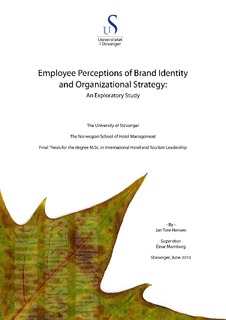| dc.description.abstract | To stay competitive in a demanding and dynamic business environment, organizations must
rely on capabilities and commitment of their human resources. Organizations realize
strategic success through employee contributions that are aligned with the organizational
identity and strategic approach.
This research project focuses on employees in the hotel industry, and seeks to describe their
perceptions of brand identity and organizational strategy. Based on this, it further seeks to
examine whether organizational behavior influences these perceptions.
The employee perceptions of brand identity and organizational strategy are measured as
consciousness and knowledge of four variables: organizational goals, vision statement,
values, and individual goals.
The organizational behavior is measured as perceptions of six variables: individual
empowerment, internal marketing, leadership practiced by leaders, empowerment practiced
by leaders, strategic change, and employee satisfaction.
Two research questions are specified through an extensive theoretical framework:
Q1: “How do employees perceive their hotel’s brand identity and organizational strategy?”
Q2: “Do the six organizational behavior-oriented variables influence employee perceptions
of brand identity and organizational strategy?”
The findings for the first research question indicate that there is a generally high employee
consciousness and knowledge of organizational goals, vision statement, values, and
individual goals. However, concerning the vision, a minority of the sample seems to
disrespect their organizational vision and the philosophy behind it. Concerning the values, a
small portion of the sample seems to think that clear organizational values are not important
for them to increase their work efficiency and motivation. Additionally, regarding the
individual goals, a small portion of the sample has seemingly replied that their individual
goals do not align well with their organizational goals.
The findings for the second research question indicate that a positive perception of
individual empowerment and internal marketing both will result in a partly increased
employee consciousness and knowledge of brand identity and organizational strategy.
Furthermore, a positive perception of strategic change will result in an increased employee
consciousness and knowledge of brand identity and organizational strategy. Last, a positive
perception of leadership practiced by leaders, empowerment practiced by leaders, and
employee satisfaction will not result in an increased employee consciousness and knowledge
of brand identity and organizational strategy. | en_US |
